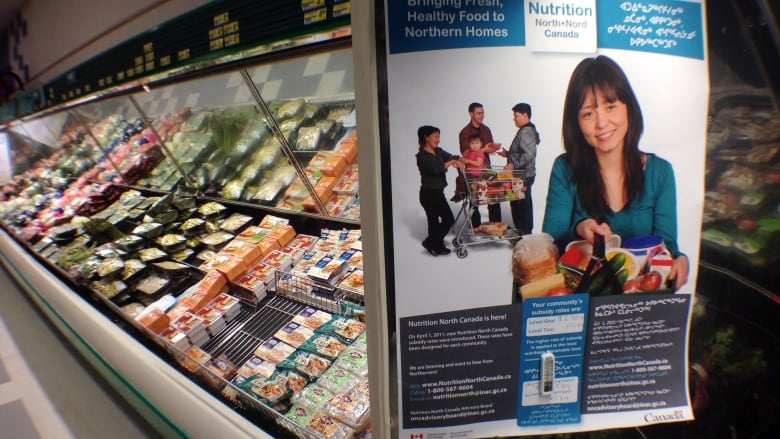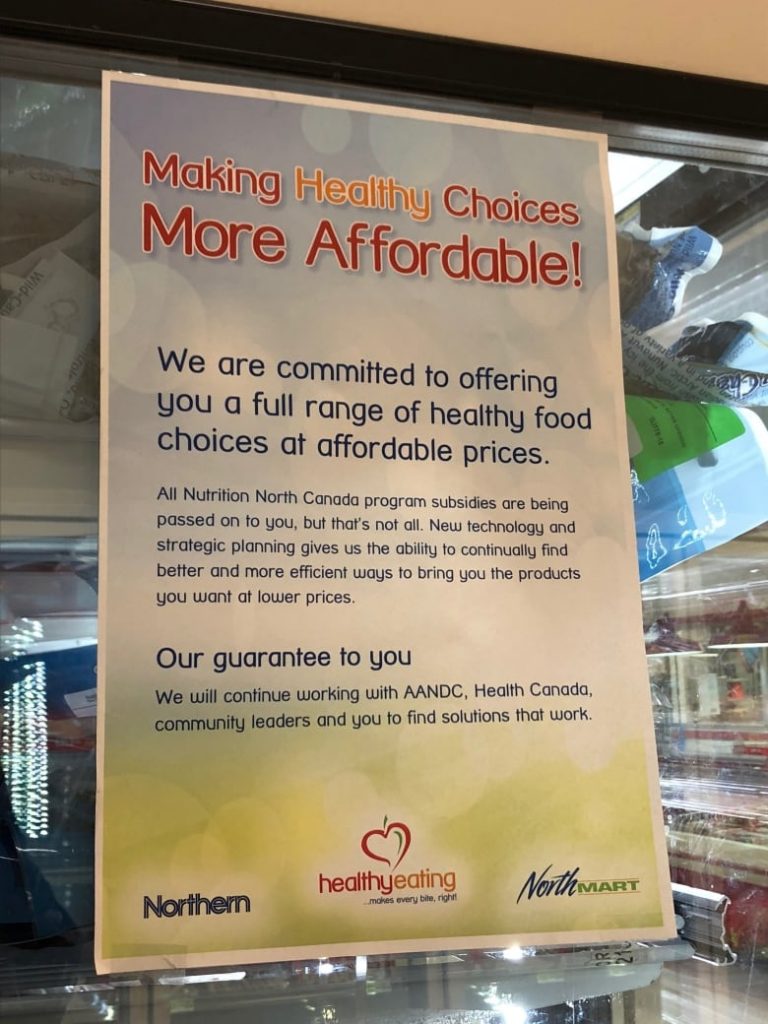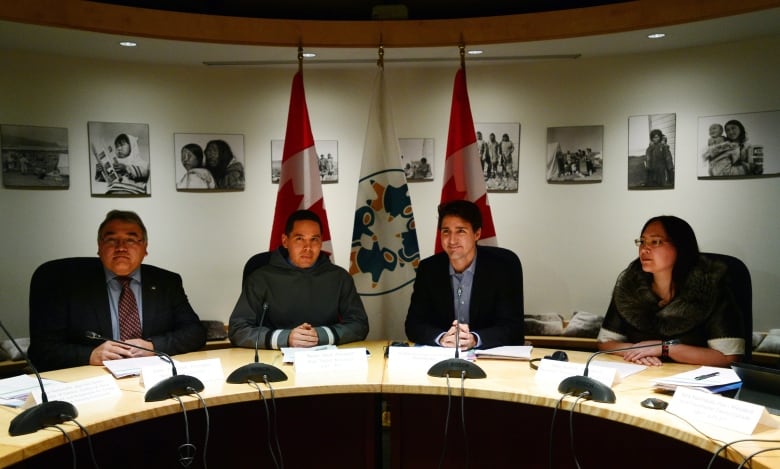Canadian gov holds off on Nutrition North changes to gather more input from Inuit

The federal government is holding off on cutting Nutrition North subsidies to nearly three dozen food items, CBC News has learned.
The changes were supposed to come into effect on April 1, and would have seen items that are high in sugar, and other specialty items — like dragon-fruit and “fancy-cut” meats — removed from the Nutrition North foods list. (The complete list is at the bottom of this story.)
Instead, the government wants more input from the newly-created Inuit-Crown food security working group, before finalizing cuts to the Nutrition North foods list.
In December, the government announced long-awaited changes to the embattled Nutrition North program, including the addition of foods to the subsidy list and higher subsidies for milk, frozen fruit and vegetables, and infant formula. Those additions were implemented in January and are still in effect.
“What we’ve informed retailers is to maintain the subsidy list, as it is, until the Inuit-Crown working group on food security can do its work and provide its recommendations,” said Wayne Walsh, the federal director general of northern strategic policy.
The government said the subsidy list will remain as it is now until April 1, 2020.
“As it stands now, we will continue to provide those subsidies until such time that the working group can complete its work,” Walsh said.

Meanwhile, retailers are pleased the move will give their customers some reprieve for the time being.
“There were some key items that would have dropped off the list,” said Derek Reimer, the director of business development for The North West Company, which runs Northern stores and NorthMarts across the North.
“There could have been a substantial increase in prices on some of these items.”
No subsidies on sealift-shipped items, yet
Reimer also added he hopes the government will take this extra time to consider even more changes to the program.
The government’s changes to Nutrition North in December were almost entirely informed from feedback it received during its 2016 consultation tour of 18 northern communities. One of the criticisms of the program was that it didn’t subsidize diapers, and the subsidies for ingredients to make Inuit staple foods (like flour for bannock) were too low.
The government added diapers to the subsidy list, and increased the subsidy rates for flour in its changes announced in December. But what it didn’t take into account is how those two products, and many others like it, are shipped to Nunavut’s communities.
Many non-perishable items are brought in by cargo ship (sealift) during the open-water season, but items have to be flown in to be eligible for the Nutrition North subsidy.
Retailers only fly certain products in when their sealift supplies run out, meaning for most of the year those items, initially brought in by sealift, aren’t subsidized at the checkout counter.
“The one thing that we think would be a positive development, and we believe that the government will take a look at this, is possibly considering subsidize sealift products, and provide a partial subsidy,” Reimer said.
“I would hope [the 12-month pause on changes] is ample time to address this issue.”
Inuit-Crown food security group still in early stages
While announcing changes to Nutrition North in December, the government also created a new Inuit-Crown working group on food security.
The move was in response to criticism from Inuit leaders, who complained the federal government was not listening to Inuit in reviewing Nutrition North. Those concerns came to a head in April 2018, when all Inuit regions left the government’s Indigenous working group on food security, in protest.
This new group, separate from other Indigenous groups, recently received a workplan when the federal government and Inuit leaders sat down earlier this month for its latest Inuit-Crown partnership committee meeting — which Prime Minister Justin Trudeau attended.

In a statement, Inuit Tapiriit Kanatami, the organization representing some 60,000 Inuit in Canada, said the two sides agreed to “co-develop a framework to evaluate the impact of Nutrition North Canada on reducing food insecurity among Inuit, and to review the NNC subsidy list.”
Here’s the list of foods slated to have Nutrition North subsidies cut, as provided by Crown-Indigenous Relations and Northern Affairs Canada:
Fruits and Vegetables
- Hash browns, and other potato products
- All other dried unseasoned vegetables (e.g.: onion flakes, dried vegetable mixes, seaweed)
- Fruits or vegetables such as star fruit, passion fruit, bok choy
- Dried fruit unsweetened (other than raisins, dates, prunes and currants)
Grain Products
- Croissants, garlic bread and items with fillings, confections, cheese, extra sweeteners or coatings
- Ready-to-eat breakfast cereals, sugary cereals, added sweetener, low in fibre, or with confections
- Rye and other semi-perishable flours and cake and pastry flour
- Fresh and Frozen pasta — excluding combination foods that contain pasta
Milk and Dairy Products
- Chocolate milk, strawberry milk and other flavoured milk, milk with sweetening agents, milk drinks, milk shakes and milk shake mixes
- Processed cheese spreads with added seasonings, spices, condiments, chocolate, fruits, vegetables, pickles, relishes, nuts, prepared or preserved meat, prepared or preserved fish
- Yogurt with added jams, cereal, spices, vegetables, confections, seasonings, herbs, or nuts
- Fortified soy beverages
- Ice cream mix, ice cream with cookies/candies/syrup
- Ice milk
- Frozen yogurt, sorbet and sherbet
- Snacks (e.g., popsicles, bars, sandwiches, individual servings)
- Commercial containers of a size greater than four litres
Meat and alternatives
- All cuts of bacon except side bacon
- Turkey bacon
- Deli meats (except for baloney, ham, turkey)
- Cured and smoked products
- Products that are seasoned, breaded, battered, or in pastry except for fish sticks and fish cakes
- Nut butters except for peanut butter
- All seasoned, salted or sweetened seeds and nuts
- Tofu and similar vegetable-based meat substitutes (e.g., vegetable patties and nut burgers)
Infant Food
- Toddler formula
- Baby juices
- Items in plastic containers or foil pouches
Other Food
- Garnishing oils
- Flavoured oils
- Salad dressings and dips
- Shortening
- Fresh pizza, pizza pops and pizza pockets
- All types of salt which are not table or sea salt
- Fresh and frozen combination foods (e.g., lasagna) – excluding those containing products that are breaded, battered or in pastry or desserts, poutine, prepared sandwiches, hamburgers, hot dogs, prepared salads, other prepared foods for immediate consumption that are subject to GST.
Related stories from around the North:
Canada: Millions of dollars in grocery subsidies haven’t lessened food insecurity in Canada’s North, CBC News
Finland: One in 10 Finnish families with young children dealing with food insecurity: survey, Yle News
Sweden: Swedes eating less meat than before, Radio Sweden
United States: New farm bill program aims to fight food insecurity in Alaska, Alaska Public Media



